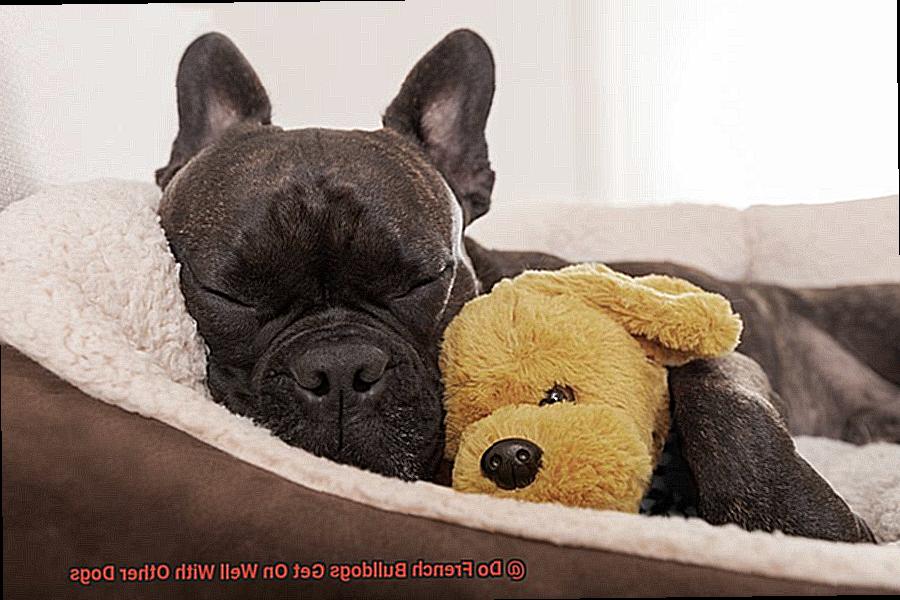Do French Bulldogs Get On Well With Other Dogs?
French Bulldogs, those cute little creatures with their bat-like ears and squished faces, have skyrocketed in popularity as pets.
But if you’re thinking about bringing a French Bulldog into your fur-filled clan, you might be wondering how they’ll get along with other dogs. In this blog post, we’re diving deep into this question to unravel the social nature of these lovable canines.
Let’s uncover the truth.
Factors That Impact French Bulldogs’ Interactions With Other Dogs
Contents
- 1 Factors That Impact French Bulldogs’ Interactions With Other Dogs
- 2 The Benefits of Socialization for French Bulldogs
- 3 Training Your French Bulldog to Interact Appropriately With Other Dogs
- 4 Some French Bulldogs Prefer Human Companionship Over Canine Companionship
- 5 Signs of Aggression in French Bulldogs During Dog-to-Dog Interactions
- 6 Supervising Your French Bulldog When Meeting New Dogs
- 7 Creating a Positive Environment for Dog-to-Dog Interactions
- 8 Conclusion
French Bulldogs are known for their friendly and sociable nature, but their interactions with other dogs can vary depending on several factors. Understanding these factors can help French Bulldog owners create positive and harmonious relationships between their pets and other dogs. In this article, we will explore the key factors that impact French Bulldogs’ interactions with other dogs, including breed traits, socialization, training, health issues, age and gender dynamics, and previous experiences.
Breed Traits:
French Bulldogs are generally good-natured and enjoy the company of humans and other animals. However, individual temperament can vary, and some French Bulldogs may exhibit more dominant or aggressive behaviors towards other dogs. It is important to assess your French Bulldog’s unique personality and adjust their interactions accordingly.
Socialization:
Early and positive exposure to different environments, people, and animals is crucial for French Bulldogs’ socialization. This helps them develop confidence, learn appropriate communication signals, and understand how to interact calmly with other dogs. Gradual introductions to various breeds, sizes, and temperaments from a young age can help them become well-rounded and comfortable in different social situations.
Training:
Effective training techniques play a significant role in French Bulldogs’ interactions with other dogs. Basic obedience training helps establish boundaries and teaches commands such as “sit,” “stay,” and “leave it,” which can be useful in managing their behavior around other dogs. Training also helps develop impulse control and appropriate responses to social cues, reducing the likelihood of conflicts or aggressive behaviors.
Health Issues:
Some French Bulldogs may experience health issues like brachycephalic syndrome, which affects their ability to engage in strenuous physical activities or play sessions with more energetic dogs. Regular veterinary care is essential to maintain optimal health and ensure that your French Bulldog can interact comfortably with other dogs.
Age and Gender:
Age and gender can influence French Bulldogs’ interactions with other dogs. Puppies tend to be more curious and playful, whereas adult French Bulldogs may exhibit territorial or protective behaviors. Additionally, intact males may display more dominant behaviors towards other male dogs. Monitoring and managing these interactions is crucial to prevent conflicts or aggression.
Previous Experiences:
Past experiences with other dogs can significantly impact a French Bulldog’s behavior. Negative experiences, such as being attacked or bullied, can lead to fear or aggression towards unfamiliar dogs. Positive experiences, on the other hand, reinforce friendly behavior. Understanding your French Bulldog’s past experiences can help you introduce them to new dogs in the best possible way.
The Benefits of Socialization for French Bulldogs
While French Bulldogs are known for their sociable nature, proper socialization plays a vital role in shaping their behavior and ensuring harmonious interactions with other dogs. So, let’s dive into the pawsitive perks of socialization.
Building Good Behavior and Manners:
Just like humans, French Bulldogs need to learn how to navigate the social world. Through socialization, they develop impeccable behavior and paw-some manners when engaging with other dogs. This process equips them with the ability to effectively communicate, interpret body language, and understand social cues.
Boosting Confidence and Curbing Aggression:
By exposing our Frenchies to a variety of doggy encounters and situations, we help them become more confident and less prone to fear or aggression. This proactive approach can nip potential behavioral issues in the bud, ensuring our pooches grow into well-adjusted members of the doggy community.
Forging Lifelong Friendships:
Socialization provides an avenue for French Bulldogs to build positive experiences and establish paw-sitive relationships with their fellow furry pals. By fostering these friendships from an early age, we reduce the likelihood of any aggressive or territorial behavior towards unfamiliar dogs. After all, who doesn’t want their Frenchie to have a BFF at the dog park?
Enhancing Overall Well-being:
Socialization is more than just playtime; it contributes to our Frenchies’ overall well-being. It provides mental stimulation, physical exercise, and opportunities for them to explore their surroundings in a safe and controlled manner. So, let’s get those tails wagging and those little legs moving.
Tips for Effective Socialization:

- Start Early: Begin socializing your French Bulldog as a puppy when they are more receptive to new experiences.
- Exposure to Different Environments: Take your Frenchie to parks, dog-friendly establishments, and other social settings where they can interact with dogs of various sizes, breeds, and temperaments.
- Gradual Exposure: Start with controlled interactions and gradually increase the level of difficulty or intensity as your Frenchie becomes more comfortable and confident.
- Positive Reinforcement: Use treats, praise, or play to reward calm and friendly behavior towards other dogs.
- Consistency is Key: Regularly expose your Frenchie to other dogs and provide opportunities for interaction to solidify their social skills.
Training Your French Bulldog to Interact Appropriately With Other Dogs
When it comes to training your French Bulldog to interact with other dogs, it’s essential to start early and focus on positive reinforcement. With the right approach, you can help your Frenchie become a social butterfly in no time.
- Start socializing from a young age: Just like humans, dogs learn best when they are young. Begin exposing your French Bulldog to different environments, people, and dogs as early as possible. This will help them become comfortable and confident in various situations.
- Controlled introductions: Begin by introducing your Frenchie to friendly, well-behaved dogs in controlled settings such as dog parks or obedience classes. Keep a close eye on their interactions and reward positive behavior with treats and praise. This will teach your Frenchie that good behavior leads to good things.
- Gradual exposure: As your Frenchie becomes more comfortable with other dogs, gradually increase the difficulty of the interactions. Introduce them to dogs of different sizes, breeds, and temperaments. This will help them learn how to communicate and interact with a variety of dogs.
- Basic obedience commands: Teach your Frenchie basic obedience commands such as sit, stay, and leave it. These commands will come in handy when you need to redirect their attention or control their behavior around other dogs. Consistency is key here – practice these commands regularly in different environments.
- Positive reinforcement: Use positive reinforcement techniques to reward your Frenchie for good behavior during interactions with other dogs. This can include treats, toys, or verbal praise. Avoid using punishment or force, as it can create fear or aggression in your dog.
- Seek professional help if needed: If your Frenchie shows signs of aggression or fear towards other dogs, don’t hesitate to seek professional help from a dog trainer or behaviorist. They can provide guidance on how to address these issues and help your dog become more comfortable around other dogs.
- Be patient and understanding: Remember that every dog is unique, and some French Bulldogs may have a harder time getting along with other dogs than others. It’s essential to be patient and understanding while working with your dog on their social skills. Celebrate small victories and don’t get discouraged if progress is slow.
- Prioritize safety: Always prioritize the safety of your Frenchie and other dogs. If you notice any signs of discomfort or aggression during interactions, separate the dogs calmly and reassess the situation. Safety should always come first.
Some French Bulldogs Prefer Human Companionship Over Canine Companionship
French Bulldogs are known for their charming personalities and affectionate nature. They have a special affinity for humans and often prefer their company over spending time with other dogs. If you’ve ever wondered why your French Bulldog seems to be more interested in cuddling up with you than playing with other canines, here are a few reasons that might shed some light on this adorable behavior.
Bred to be Companions
French Bulldogs have a rich history as companion dogs. They were initially bred to be lap dogs, providing comfort and companionship to upper-class families. This breeding purpose has instilled in them a natural inclination towards human companionship.
Thrive on Human Interaction
French Bulldogs thrive on human interaction and attention. They love being the center of attention and enjoy the undivided love and affection they receive from their owners. They have a strong attachment to their humans and genuinely enjoy spending quality time with them.
Jealousy and Possessiveness
French Bulldogs can be quite possessive of their owners’ attention. They may become jealous or territorial when other dogs are around, preferring to have their humans all to themselves. This possessiveness can further reinforce their preference for human companionship.
Not All Dogs Are Created Equal
While some French Bulldogs may get along well with other dogs, many are simply not interested in canine companionship. They may show little interest in playing or socializing with other dogs and would much rather be by their owner’s side.
The Joy of a One-on-One Bond
The preference for human company is not necessarily a negative trait. Many French Bulldog owners appreciate the strong bond they share with their furry friends. The one-on-one connection allows for deep emotional attachment and creates a unique relationship that brings immense joy and fulfillment.
To ensure that your French Bulldog develops healthy social skills and doesn’t become overly dependent on human companionship, it’s important to provide appropriate socialization opportunities. Here are a few tips to help your French Bulldog embrace canine companionship:
- Introduce your French Bulldog to other dogs in a controlled and supervised environment.
- Arrange playdates with well-behaved and friendly dogs.
- Consider enrolling your furry friend in obedience classes where they can interact with other dogs and learn valuable social skills.
- Visit dog parks, ensuring that the environment is safe and the other dogs are well-behaved.
Remember, every French Bulldog is unique, and their preferences may vary. While some may enjoy the company of other dogs, others may thrive as the sole focus of their owner’s attention. Understanding your French Bulldog’s personality and providing appropriate socialization will help them lead a balanced and fulfilling life with both humans and canines.
Signs of Aggression in French Bulldogs During Dog-to-Dog Interactions
French Bulldogs are known for their friendly and affectionate nature, but like any other breed, they can display signs of aggression during dog-to-dog interactions. It’s crucial for French Bulldog owners to be aware of these signs in order to prevent any potential conflicts and ensure the safety of all dogs involved. In this section, we will explore the various signs of aggression in French Bulldogs during dog-to-dog interactions.
- Growling: When a French Bulldog feels threatened or uncomfortable, they may emit a low, rumbling growl as a warning to the other dog. This is their way of saying “back off” or “I don’t want to engage.”
- Snapping or lunging: If you notice your French Bulldog snapping or lunging towards another dog, it is a clear sign of aggression. This behavior indicates that they are ready to defend themselves or assert dominance.
- Raised hackles and stiff body posture: When a French Bulldog’s hackles are raised and its body appears rigid, it signifies that they are prepared for a potential confrontation. This is a visual indication that they are feeling threatened and may resort to aggressive behavior if necessary.
- Showing teeth or biting: If your French Bulldog bares its teeth or attempts to bite another dog, it is a clear signal that they are feeling threatened and may escalate the situation further. This aggressive behavior should be taken seriously and addressed promptly.
- Excessive barking: Continuous barking at another dog during an interaction can be seen as a form of aggression. This may indicate frustration or an attempt to intimidate the other dog.
It’s important to note that not all aggression in French Bulldogs is necessarily aggressive behavior. Sometimes, what may seem like aggression is actually fear-based or defensive behavior due to past negative experiences or lack of socialization. Understanding the underlying causes of your French Bulldog’s aggression is crucial in addressing and managing the behavior.
If you notice signs of aggression in your French Bulldog during dog-to-dog interactions, it is recommended to seek the assistance of a professional dog trainer or behaviorist. They can help you understand the underlying causes and implement appropriate training techniques to manage and modify the aggressive behavior.
Proper socialization from an early age plays a crucial role in preventing aggressive tendencies in French Bulldogs. Exposing them to various environments, people, and other dogs in a controlled manner can help them develop positive associations and learn appropriate social behaviors.
Supervising Your French Bulldog When Meeting New Dogs
Picture this: you’re out for a leisurely stroll with your French Bulldog, enjoying the sunshine and fresh air. Suddenly, you spot another dog approaching. As an experienced Frenchie owner, you know that proper supervision is key when it comes to introducing your furry friend to new dogs. Why is this so important? Let’s dig into the details.
#1 Safety First: French Bulldogs and Aggression
French Bulldogs, with their adorable squishy faces and playful personalities, are generally known for their friendly nature. However, they can sometimes exhibit signs of aggression when meeting new dogs. This may be due to their territorial instincts or a lack of socialization. By closely supervising these interactions, you can intervene if any signs of aggression arise and prevent potential conflicts.
#2 Brachycephalic Breeds and Respiratory Distress
Ah, the distinctive feature of French Bulldogs – their cute, smushed faces. While this characteristic adds to their charm, it also comes with some challenges. Frenchies are brachycephalic breeds, meaning they have a shortened skull. This can lead to respiratory issues and difficulty breathing, especially in situations of high excitement or stress. By closely monitoring their interactions with other dogs, you can ensure that your Frenchie doesn’t become overly exerted and risk respiratory distress.
#3 Neutral Territory: A Must for Successful Introductions
When introducing your French Bulldog to a new dog, it’s crucial to create a neutral and controlled environment. This helps prevent any territorial behaviors and reduces the likelihood of conflict. Imagine two pups meeting on a neutral turf – no need for barks or growls. To maintain control over both dogs during these initial meetings, it’s recommended to use a leash or harness. This way, you can intervene if necessary and ensure a smooth introduction.
#4 Signs to Watch For: Understanding Canine Communication
Dogs have their own way of communicating, and it’s important for owners to understand their furry friend’s body language. During these interactions, keep an eye out for excessive barking, growling, snarling, raised fur, stiff body posture, and lunging. These are indications that your Frenchie may be feeling threatened or uncomfortable. If you notice any of these signs, it’s crucial to separate the dogs and try again at a later time or seek professional help from a dog trainer or behaviorist.
#5 Positive Reinforcement: Treats and Praise
Who doesn’t love rewards? Positive reinforcement training can work wonders when it comes to helping your French Bulldog learn appropriate social skills with other dogs. By rewarding good behavior with treats or praise, you can help your Frenchie associate positive experiences with meeting new dogs. This sets the stage for enjoyable future interactions and strengthens the bond between you and your furry companion.
Creating a Positive Environment for Dog-to-Dog Interactions
French Bulldogs are known for their sociable and friendly nature, but just like any other breed, they may have different temperaments and preferences when it comes to interacting with other dogs. To ensure that your French Bulldog has positive experiences and can socialize well with other dogs, it is important to create a positive environment for their dog-to-dog interactions. Here are some steps you can take:
- Proper Socialization from a Young Age: Introduce your French Bulldog to different dogs and social settings early on. This helps them become more comfortable and confident in their interactions. Take them to puppy classes, arrange playdates with other friendly dogs, and expose them to various environments.
- Use Positive Reinforcement: Positive reinforcement techniques can be highly effective in encouraging good behavior during dog-to-dog interactions. Reward your French Bulldog with treats or praise when they exhibit calm and friendly behavior. This helps create positive associations and reinforces desirable behavior.
- Gradual and Controlled Introductions: When introducing your French Bulldog to new dogs, it is crucial to do so gradually and in a controlled manner. Sudden or overwhelming introductions can lead to fear or aggression. Allow the dogs to get acquainted at their own pace, keeping a close eye on their body language and intervening if necessary.
- Supervision is Key: Always supervise dog-to-dog interactions, especially when introducing a French Bulldog to unfamiliar dogs. Dogs communicate through body language, so it is important to monitor their signals for stress or discomfort. Intervene if any signs of aggression or tension arise to prevent conflicts or negative experiences.
- Regular Exercise and Playtime: Providing regular opportunities for exercise and playtime with other dogs can contribute to creating a positive environment for French Bulldogs. Engage in activities such as walks, playdates, or visits to dog parks. This helps them develop good social skills and strengthens their bond with other dogs.
- Respect Individual Preferences: Remember that not all French Bulldogs will get along with every dog they encounter. Dogs, like humans, have different personalities, and some individuals may be more selective in their canine companionship. Respect their preferences and ensure their safety by avoiding forced interactions.
Conclusion
In conclusion, French Bulldogs generally have a friendly and sociable nature when it comes to interacting with other dogs.
They tend to get along well with their canine counterparts and can form strong bonds with them. However, it is important to note that individual personalities and socialization play a significant role in determining how well a French Bulldog will get along with other dogs.
With the right approach, French Bulldogs can thrive in multi-dog households and enjoy the companionship of their furry friends.




